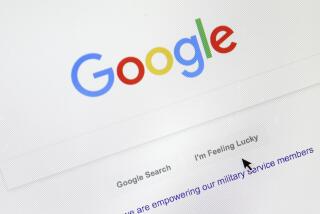Code Overload
- Share via
I remember my first time. It was scary and yet exciting. When it was over, I knew I had entered a whole new realm of existence. I knew I was no longer a child.
But I wasn’t prepared for the onslaught, the societal pressure, the subsequent promiscuity.
See, when I got my first bank card PIN, I thought it was kind of fun; as children, we reveled in passwords. It made us feel covert and significant. It made us feel special. So when the other codes--for the credit cards, the calling cards, the work ID cards--started piling up, I thought I could handle it. I thought I’d be fine.
I was wrong.
It was when I entered my home-phone message center password into a cashier’s ATM, then had to wait under the glare of the less than sympathetic couple behind me as she cleared it out and began again that I realized I was in over my head, encrypted beyond endurance. They swirl in my head in a non sequitur foam: PINs and codes and user names, codes that are all numbers, codes that are all letters, codes that require a mixture of the two, for my phone at work, my phone at home, my computer at work, my computer at home, for AOL and Netscape, for a variety of Web site services, for my ATM, my garage door, and the ladies’ locker room at the YMCA--many of them assigned, few of them related, fewer still identical.
For a person not even remotely involved in the Secret Service, the KGB or the INS, this is an insane number of codes to memorize.
And I am not alone.
Friends with cell phones and beepers and home alarm systems, with multiple e-mail accounts and e-Trade accounts and EBay accounts, with punch-pad security systems at work and their children’s schools, are even worse off than I.
We try to stay in control, memorizing the telephone punch pad (no letters over the number 1, no q, no z), so we can transform our PINs into easily remembered words. But in the global workplace, it’s never that simple. Steve Weiss, who works in telecommunications and finance for an international bank, has three computers and three phone lines--in L.A., Miami and Brazil--all with at least two codes each. “I try to make them all the same number,” he says. “But some you can’t because they require more digits. So I wind up writing them down and taping them to my computer, which completely defeats the purpose.”
Carol Barudi, co-author of “The Internet for Dummies,” insists that most codes, even assigned ones, can be changed; she has been able to pare most of her computer passwords down to one. Such a code, she advises, should include a non-alphabet character so it can’t be cracked by a dictionary search, and should not be easily guessed by someone who knows you.
But, she admits, many people are intimidated by the steps one must take to change an assigned password and by our numerical age in general.
“Only 40% of bank customers use ATMs,” she says. “And part of the reason is they either distrust or disdain the technology. It doesn’t seem to be that big a deal for young people. But people who didn’t grow up with computers have a hard time. It doesn’t go along with their sense of how things are, with their intuitive representation of information.”
For many of us, numbers are the Other, their ways and means inexplicable. And even those of us who can, say, do long division in our heads, find being considered a number demoralizing. Numeric identifications conjure such horrifying images as prison inmates, POWs and even Holocaust victims. People rebelled unsuccessfully against numeric area codes, against ZIP codes, against required Social Security numbers. One of the recurring themes of futuristic fiction has been the devolution of human identity into a mere string of numbers. And indeed it would seem that the future is upon us.
Even a technophile like Barudi has her limits; she has yet to memorize her new, expanded ZIP Code. “Last year,” she says, “they changed both my area code and my ZIP Code and I thought, this is too much. There is only so much numerical abuse they can inflict on us after all.”
More to Read
Sign up for The Wild
We’ll help you find the best places to hike, bike and run, as well as the perfect silent spots for meditation and yoga.
You may occasionally receive promotional content from the Los Angeles Times.







